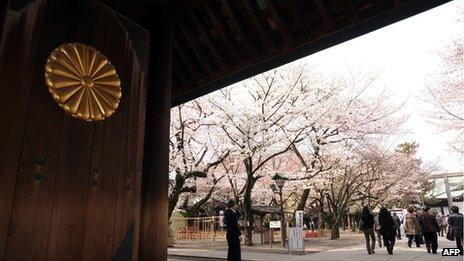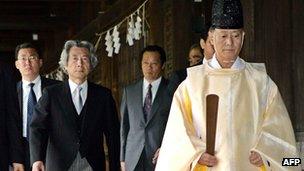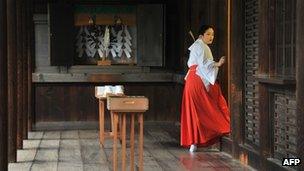Japan's Yasukuni Shrine
- Published

The souls of Japan's war dead are enshrined at Yasukuni
The Yasukuni Shrine - the name means peaceful country - in Tokyo, Japan, is a Shinto shrine founded in 1869 on the orders of Emperor Meiji.
The shrine is dedicated to souls of about 2.5 million Japanese men, women and children who died for their country since that time.
They include soldiers, war-time nurses, students who entered battle and those who committed suicide in shame at the end of World War II.
At the centre of the shrine's controversy is the fact that those venerated include 14 convicted Class A war criminals, including Prime Minister General Hideki Tojo, who was executed for war crimes in 1948.

Mr Koizumi made six visits when he was prime minister
Within the shrine, the souls of the dead are worshipped rather than just remembered.
According to Japan's national Shinto religion, humans are transformed into kami or deities when they die, and as such, are worshipped by their descendants.
Surrounded by war banners and military regalia, the Yasukuni kami are venerated by hundreds of thousands of visitors at the shrine each year.
Compared with most Shinto shrines, which were founded hundreds of years ago, the dedication of the Yasukuni shrine was a relatively recent affair.
Analysts say that because the main wars it commemorates are those with China and the US, it appears to the political left to symbolise foreign invasions.
To the right, it is a symbol of patriotism.
The shrine is frequently at the centre of political storms. There have been several parliamentary debates aimed at removing General Tojo's kami, but nationalists have blocked these every time.
The debate intensifies in the lead up to 15 August - the anniversary of Japan's surrender in World War II.
Official visits

Hundreds of thousands of people visit Yasukuni each year
Several lawmakers pay their respects at the shrine each year, but only one prime minister, Yasuhiro Nakasone in 1985, has made an official visit since the war.
Former Prime Minister Ryutaro Hashimoto made what he said was a private visit on his birthday in July 1996.
Prime Minister Junichiro Koizumi made six visits to Yasukuni during his time in office from 2001-2006. Arguments have ensued over whether these were made in a private or official capacity.
Visits by leaders and senior ministers anger Japan's Asian neighbours, especially China, South Korea and North Korea, who were victims of the country's military aggression in the first half of the 20th century.
They say the shrine represents Japan's past militarism - something for which they feel it has not fully apologised.
"The Yasukuni Shrine issue is about whether Japan correctly acknowledges its history of invasion and of Japanese militarism, and about the feelings of the people in victims' countries, including China," China's Foreign Ministry spokesman Hong Lei said.